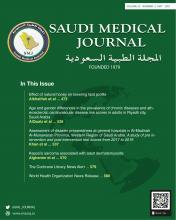Research ArticleOriginal Article
Open Access
Translation, cultural adaptation, and evaluation of the psychometric properties of an Arabic diabetes distress scale
A cross sectional study from Saudi Arabia
Mohammed A. Batais, Fahad D. Alosaimi, Abdulrahman A. AlYahya, Ouf A. Aloofi, Mohammad K. Almashouq, Khalid S. Alshehri and Abdulaziz F. Alfraiji
Saudi Medical Journal May 2021, 42 (5) 509-516; DOI: https://doi.org/10.15537/smj.2021.42.5.20200286
Mohammed A. Batais
From the Department of Family and Community Medicine (Batais); From the Department of Psychiatry (Alosaimi); and from the College of Medicine (AlYahya, Aloofi, Almashouq, Alshehri, Alfraiji), King Saud University Medical City, King Saud University, Riyadh, Kingdom of Saudi Arabia.
MBBS, SBFMFahad D. Alosaimi
From the Department of Family and Community Medicine (Batais); From the Department of Psychiatry (Alosaimi); and from the College of Medicine (AlYahya, Aloofi, Almashouq, Alshehri, Alfraiji), King Saud University Medical City, King Saud University, Riyadh, Kingdom of Saudi Arabia.
MDAbdulrahman A. AlYahya
From the Department of Family and Community Medicine (Batais); From the Department of Psychiatry (Alosaimi); and from the College of Medicine (AlYahya, Aloofi, Almashouq, Alshehri, Alfraiji), King Saud University Medical City, King Saud University, Riyadh, Kingdom of Saudi Arabia.
Medical InternOuf A. Aloofi
From the Department of Family and Community Medicine (Batais); From the Department of Psychiatry (Alosaimi); and from the College of Medicine (AlYahya, Aloofi, Almashouq, Alshehri, Alfraiji), King Saud University Medical City, King Saud University, Riyadh, Kingdom of Saudi Arabia.
Medical InternMohammad K. Almashouq
From the Department of Family and Community Medicine (Batais); From the Department of Psychiatry (Alosaimi); and from the College of Medicine (AlYahya, Aloofi, Almashouq, Alshehri, Alfraiji), King Saud University Medical City, King Saud University, Riyadh, Kingdom of Saudi Arabia.
Medical InternKhalid S. Alshehri
From the Department of Family and Community Medicine (Batais); From the Department of Psychiatry (Alosaimi); and from the College of Medicine (AlYahya, Aloofi, Almashouq, Alshehri, Alfraiji), King Saud University Medical City, King Saud University, Riyadh, Kingdom of Saudi Arabia.
Medical InternAbdulaziz F. Alfraiji
From the Department of Family and Community Medicine (Batais); From the Department of Psychiatry (Alosaimi); and from the College of Medicine (AlYahya, Aloofi, Almashouq, Alshehri, Alfraiji), King Saud University Medical City, King Saud University, Riyadh, Kingdom of Saudi Arabia.
Medical Intern
References
- 1.↵International Diabetes Federation. Diabetes Atlas. 9th ed. Brussels, Belgium, 2019. [Updated 2021. Accessed 2021 April 13] Available at: https://diabetesatlas.org/en/
- 2.↵
- Alotaibi A,
- Perry L,
- Gholizadeh L,
- Al-Ganmi A.
- 3.↵
- Aljuaid MO,
- Almutairi AM,
- Assiri MA,
- Almalki DM,
- Alswat K.
- 4.↵
- Alzughbi T,
- Badedi M,
- Darraj H,
- Hummadi A,
- Jaddoh S,
- Solan Y, et al.
- 5.↵
- 6.↵
- Fisher L,
- Skaff MM,
- Mullan JT,
- Arean P,
- Mohr D,
- Masharani U, et al.
- 7.↵
- Schmidt CB,
- van Loon BJP,
- Vergouwen ACM,
- Snoek FJ,
- Honig A.
- 8.↵
- 9.↵
- Owens-Gary MD,
- Zhang X,
- Jawanda S,
- Bullard KMK,
- Allweiss P,
- Smith BD.
- 10.↵
- Aljuaid MO,
- Almutairi AM,
- Assiri MA,
- Almalki DM,
- Alswat K.
- 11.↵
- Darawad MW,
- Hammad S,
- Samarkandi O.
- 12.↵
- Thanakwang K,
- Thinganjana W,
- Konggumnerd R.
- 13.↵
- 14.↵
- William H. Polonsky,
- Fisher L,
- Earles J.
- 15.↵
- Beaton DE,
- Bombardier C,
- Guillemin F,
- Ferraz MB.
- 16.↵
- Fisher L,
- Glasgow RE,
- Skaff MM,
- Polonsky WH.
- 17.↵
- Malasi TH,
- Mirza IA,
- El-Islam MF.
- 18.↵
- Hayes, MH,
- Paterson, DG.
- 19.↵
- Al-Osaimi F,
- Al-Mulhem A,
- Al-Shalan H.
- 20.↵
- 21.↵
- Ohaeri JU,
- Awadalla AW.
- 22.↵
- Kaiser HF,
- Rice J. Little Jiffy
- 23.↵
- Ting RZW,
- Nan H,
- Yu MWM,
- Kong APS,
- Ma RCW,
- Wong RYM, et al.
- 24.↵Malays Fam Physician 2015; 10: 22–35.
- 25.↵
- Graue M,
- Haugstvedt A,
- Wentzel-Larsen T,
- Iversen MM,
- Karlsen B,
- Rokne B.
- 26.↵
- Baradaran HR,
- Mirghorbani S-M,
- Javanbakht A,
- Yadollahi Z,
- Khamseh ME.
- 27.↵
- 28.↵
- Fisher L,
- Skaff MM,
- Mullan JT.
- 29.↵
- 30.↵
- Tareen RS,
- Tareen K.
- 31.↵
- Gahlan D,
- Rajput R,
- Gehlawat P,
- Gupta R.
- 32.↵
- Beekman ATF,
- Penninx B,
- Deeg DJH,
- Ormel J,
- Braam AW,
- Van Tilburg W.
- 33.↵
- Cohen S,
- McKay G.
In this issue
Translation, cultural adaptation, and evaluation of the psychometric properties of an Arabic diabetes distress scale
Mohammed A. Batais, Fahad D. Alosaimi, Abdulrahman A. AlYahya, Ouf A. Aloofi, Mohammad K. Almashouq, Khalid S. Alshehri, Abdulaziz F. Alfraiji
Saudi Medical Journal May 2021, 42 (5) 509-516; DOI: 10.15537/smj.2021.42.5.20200286
Translation, cultural adaptation, and evaluation of the psychometric properties of an Arabic diabetes distress scale
Mohammed A. Batais, Fahad D. Alosaimi, Abdulrahman A. AlYahya, Ouf A. Aloofi, Mohammad K. Almashouq, Khalid S. Alshehri, Abdulaziz F. Alfraiji
Saudi Medical Journal May 2021, 42 (5) 509-516; DOI: 10.15537/smj.2021.42.5.20200286
Jump to section
Related Articles
- No related articles found.





